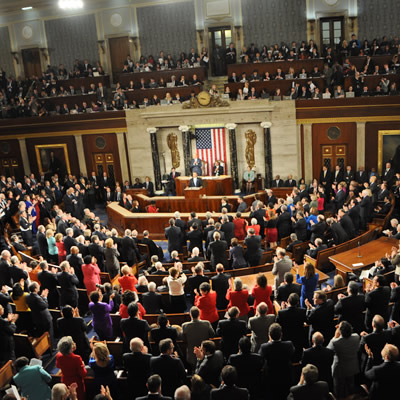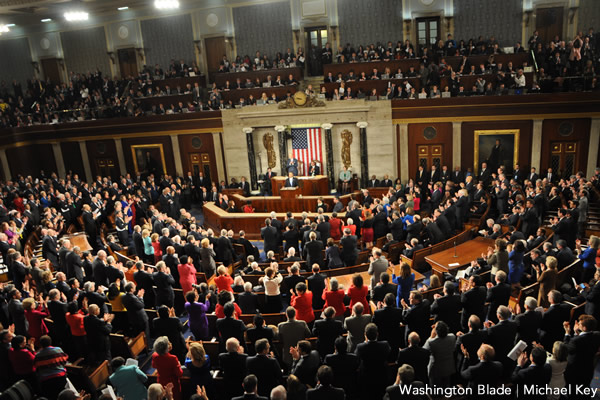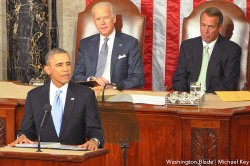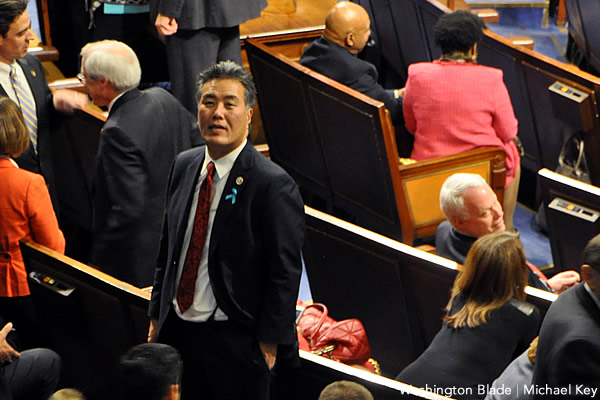National
Obama’s State of the Union light on LGBT issues
President criticized for neglecting ENDA, executive order for non-discrimination


President Obama was criticized by LGBT advocates over his State of the Union address. (Washington Blade photo by Michael Key)
President Obama had few words in his State of the Union speech Tuesday night on LGBT issues, disappointing many advocates who had wanted him to address the lack of federal non-discrimination protections for LGBT people.
Devoting a large portion of his speech to income inequality, Obama called on Congress to pass other initiatives — such as a Voting Rights Act, a measure to ensure equal pay for women and immigration reform — and pledged to sign an executive order raising the minimum wage to $10.10 an hour for federal contractors.
“In the coming months, let’s see where else we can make progress together,” Obama said. “Let’s make this a year of action. That’s what most Americans want: for all of us in this chamber to focus on their lives, their hopes, their aspirations.”
LGBT advocates had been pushing Obama to include in his speech a call to pass the Employment Non-Discrimination Act and a pledge to sign an executive order barring federal contractors from discriminating against LGBT workers.
Obama’s continued decision to withhold the LGBT executive order became more pronounced after he promised during his speech to take executive action if Congress doesn’t pass legislation, and enumerated a specific plan to boost the minimum wage through executive order. That raised questions about why he hasn’t done the same for LGBT workers.
“What I offer tonight is a set of concrete, practical proposals to speed up growth, strengthen the middle class, and build new ladders of opportunity into the middle class,” Obama said. “Some require congressional action, and I am eager to work with all of you. But America does not stand still — and neither will I. So wherever and whenever I can take steps without legislation to expand opportunity for more American families, that’s what I’m going to do.”
But Obama’s speech wasn’t completely devoid of references to the LGBT community. The president identified marriage equality as one of those issues with which the White House is partnering with “mayors, governors and state legislatures” on throughout the country.
Further, he said the administration pursues a robust foreign policy because “we believe in the inherent dignity and equality of every human being” regardless of categories like sexual orientation. Obama also said America values “equality under law” in his speech, which is of importance as courts decide the issue of marriage equality.

President Barack Obama, Vice President Joe Biden and Speaker of the House John Boehner at the 2014 State of the Union Address. (Washington Blade photo by Michael Key)
Nonetheless, the speech fell short of what LGBT advocates were calling for, prompting disappointment.
Chad Griffin, president of the Human Rights Campaign, responded to the president’s failure to address LGBT issues in his speech with criticism, a striking change in tone from the organization’s usual praise of Obama as a strong ally.
“The president’s message tonight failed to address the needs of LGBT workers looking for a fair shake in this economy,” Griffin said. “Not only was there no call for the House to pass a federal law to protect LGBT workers nationwide, President Obama also sidestepped his commitment to take action where Congress has left off, leaving out an order prohibiting discrimination by federal contractors.”
Griffin added Obama “missed a real opportunity” to commit in the State of the Union to “executive action to address anti-LGBT discrimination for the millions of Americans employed by federal contractors.”
The absence of ENDA was particularly noteworthy because just months ago, for the first time in history, the Senate approved the measure on a bipartisan basis, leaving the House as the only obstacle toward passage.
Although the president made no mention of ENDA during his speech, the White House included the legislation as part of a fact sheet distributed to reporters prior to the address, identifying LGBT non-discrimination as an issue on which the administration is “continuing to work with Congress.”
“Today, federal law prohibits employment discrimination based on race, sex, religion, and disability,” the fact sheet states. “It’s time to add sexual orientation and gender identity to that list, so that no American worker can lose his or her job simply because of who they are or who they love. ”
After noting that the Senate last year passed ENDA by a bipartisan vote, the fact sheet says Obama “renews his call for the House to do the same.”
Other advocates said they would continue to push Obama on the executive order despite the president’s exclusion of the directive from the State of the Union address.
Tico Almeida, president of Freedom to Work, said Obama’s pledge to issue an executive order on minimum wage was “great news” because it means there’s an opportunity for Obama to sign an executive order against LGBT discrimination.
“It’s disappointing ENDA did not make it into the State of the Union,” Almeida said. “But no matter what was omitted from this one address, we can still make 2014 a year of action for LGBT workplace protections by pushing the House of Representatives to allow an ENDA vote and pushing the president to keep his promise of the federal contractor executive order.”
Rea Carey, executive director of the National Gay & Lesbian Task Force, gave Obama mixed reviews after previously calling on him to use the word “transgender” and address immigration reform during his speech in addition to LGBT workplace protections.
“The president is right to urge Congress to fix our broken immigration system this year, the creation of more jobs, equal pay for women, and the restoration of the Voting Rights Act,” Carey said. “We are also pleased that the president is using his pen like he said he would to move things forward: in this instance by signing an executive order to increase the minimum wage for federal contract workers. However, he must go further and sign an executive order that bans discrimination against the same contract workers who are LGBT.”
Carey noted some of the workers who are set to receive pay raises because of the minimum wage executive order are vulnerable without the executive order for LGBT workplace non-discrimation.
“The irony is that some LGBT federal contract workers will get a pay raise but they could still be fired for who they are and who they love,” Carey said. “The longer the president waits the more damage LGBT people will face; discrimination is a painful reality that is too often the lived experience of LGBT people. The president has to act when Congress won’t.”
Gregory Angelo, executive director of the Log Cabin Republicans, took issue with the speech as a whole, not simply for Obama’s handling of workplace issues.
“For a moment, I thought the news accidentally re-ran last year’s State of the Union, because all I really saw was more of the same,” Angelo said. “In the midst of a stagnant economy, understated unemployment, and ballooning debt, the only new ideas presented by the president involved using ‘a pen and a phone’ to push a liberal agenda for which hard-working Americans have no appetite.”
Coming off a victory in which Rep. Michael Grimm (R-N.Y.) agreed to sign on as a co-sponsor of ENDA, Angelo also criticized Obama for his lack of attention in the State of the Union to LGBT non-discrimination in the workforce.
“While the president’s calls for a more equal nation are welcome, there is a profound irony in the absence of any mention of the Employment Non-Discrimination Act for LGBT workers tonight, and likewise in the president’s threat to exercise unilateral executive actions with the explosive potential to ignite class warfare, while at the same time remaining silent on signing a common-sense Executive Order barring federal workplace discrimination: an empty promise to LGBT Americans that stands unfulfilled after six years,” Angelo said.
Shin Inouye, a White House spokesperson, defended the speech by saying it wasn’t “a comprehensive list of all of the president’s positions or priorities. ”
“The president has long supported ENDA, and its inclusion in our fact sheet reflects the president’s belief that Congress needs to act,” Inouye said.
Among the guests seated behind first lady Michelle Obama in her box during the speech was Jason Collins, a former Washington Wizards center who made headlines last year after coming out as gay.
Following the speech, lawmakers who spoke to the Washington Blade on Capitol Hill said they noted the absence of ENDA in his speech, but felt assured by the president’s leadership.
Del. Eleanor Holmes Norton (D-D.C.) said she thinks the minimum wage executive order will be a “down payment” on an LGBT directive the president will issue at a later time, but took issue with the lack of any mention of ENDA.
“I would love to have seen a mention, and I don’t think I saw, other than a passing mention of the LGBT community,” Norton said. “I think the way to have done it, frankly, would have been with ENDA, because ENDA is overwhelmingly supported by the American people. It’s already been supported by the Senate. It’s ripe, so I am disappointed that that did not occur, but I’m heartened that he’s going to move, and, frankly, I think we can get ENDA out of here in the next year or two.”
Rep. Mark Takano (D-Calif.), one of seven openly gay members of the U.S. House, said he was confident Obama would take executive action to protect LGBT workers based on his previous actions.
“I tell you, 2013 was one of the gayest years in the history of human kind, and this president has used his executive orders already in how he’s interpreted the Supreme Court decisions, the way he’s applied in the ruling in the Windsor case, in ways that have been very favorable,” Takano said. “He’s done that through executive orders and interpretations, so he’s already used his executive order in the gayest way possible. So, I have hope that he’ll continue to do so.”

Rep. Mark Takano (D-Calif.) at the 2014 State of the Union Address. (Washington Blade photo by Michael Key)
New York
Two teens shot steps from Stonewall Inn after NYC Pride parade
One of the victims remains in critical condition

On Sunday night, following the annual NYC Pride March, two girls were shot in Sheridan Square, feet away from the historic Stonewall Inn.
According to an NYPD report, the two girls, aged 16 and 17, were shot around 10:15 p.m. as Pride festivities began to wind down. The 16-year-old was struck in the head and, according to police sources, is said to be in critical condition, while the 17-year-old was said to be in stable condition.
The Washington Blade confirmed with the NYPD the details from the police reports and learned no arrests had been made as of noon Monday.
The shooting took place in the Greenwich Village neighborhood of Manhattan, mere feet away from the most famous gay bar in the city — if not the world — the Stonewall Inn. Earlier that day, hundreds of thousands of people marched down Christopher Street to celebrate 55 years of LGBTQ people standing up for their rights.
In June 1969, after police raided the Stonewall Inn, members of the LGBTQ community pushed back, sparking what became known as the Stonewall riots. Over the course of two days, LGBTQ New Yorkers protested the discriminatory policing of queer spaces across the city and mobilized to speak out — and throw bottles if need be — at officers attempting to suppress their existence.
The following year, LGBTQ people returned to the Stonewall Inn and marched through the same streets where queer New Yorkers had been arrested, marking the first “Gay Pride March” in history and declaring that LGBTQ people were not going anywhere.
New York State Assemblywoman Deborah Glick, whose district includes Greenwich Village, took to social media to comment on the shooting.
“After decades of peaceful Pride celebrations — this year gun fire and two people shot near the Stonewall Inn is a reminder that gun violence is everywhere,” the lesbian lawmaker said on X. “Guns are a problem despite the NRA BS.”
New York
Zohran Mamdani participates in NYC Pride parade
Mayoral candidate has detailed LGBTQ rights platform

Zohran Mamdani, the candidate for mayor of New York City who pulled a surprise victory in the primary contest last week, walked in the city’s Pride parade on Sunday.
The Democratic Socialist and New York State Assembly member published photos on social media with New York Attorney General Letitia James, telling followers it was “a joy to march in NYC Pride with the people’s champ” and to “see so many friends on this gorgeous day.”
“Happy Pride NYC,” he wrote, adding a rainbow emoji.
Mamdani’s platform includes a detailed plan for LGBTQ people who “across the United States are facing an increasingly hostile political environment.”
His campaign website explains: “New York City must be a refuge for LGBTQIA+ people, but private institutions in our own city have already started capitulating to Trump’s assault on trans rights.
“Meanwhile, the cost of living crisis confronting working class people across the city hits the LGBTQIA+ community particularly hard, with higher rates of unemployment and homelessness than the rest of the city.”
“The Mamdani administration will protect LGBTQIA+ New Yorkers by expanding and protecting gender-affirming care citywide, making NYC an LGBTQIA+ sanctuary city, and creating the Office of LGBTQIA+ Affairs.”
U.S. Supreme Court
Supreme Court upholds ACA rule that makes PrEP, other preventative care free
Liberal justices joined three conservatives in majority opinion

The U.S. Supreme Court on Friday upheld a portion of the Affordable Care Act requiring private health insurers to cover the cost of preventative care including PrEP, which significantly reduces the risk of transmitting HIV.
Conservative Justice Brett Kavanaugh authored the majority opinion in the case, Kennedy v. Braidwood Management. He was joined by two conservatives, Chief Justice John Roberts and Justice Amy Coney Barrett, along with the three liberal justices, Sonia Sotomayor, Elena Kagan, and Ketanji Brown-Jackson.
The court’s decision rejected the plaintiffs’ challenge to the Affordable Care Act’s reliance on the U.S. Preventative Services Task Force to “unilaterally” determine which types of care and services must be covered by payors without cost-sharing.
An independent all-volunteer panel of nationally recognized experts in prevention and primary care, the 16 task force members are selected by the secretary of the U.S. Department of Health and Human Services to serve four-year terms.
They are responsible for evaluating the efficacy of counseling, screenings for diseases like cancer and diabetes, and preventative medicines — like Truvada for PrEP, drugs to reduce heart disease and strokes, and eye ointment for newborns to prevent infections.
Parties bringing the challenge objected especially to the mandatory coverage of PrEP, with some arguing the drugs would “encourage and facilitate homosexual behavior” against their religious beliefs.
-

 U.S. Supreme Court3 days ago
U.S. Supreme Court3 days agoSupreme Court upholds ACA rule that makes PrEP, other preventative care free
-

 U.S. Supreme Court3 days ago
U.S. Supreme Court3 days agoSupreme Court rules parents must have option to opt children out of LGBTQ-specific lessons
-

 India5 days ago
India5 days agoIndian court rules a transgender woman is a woman
-

 National4 days ago
National4 days agoEvan Wolfson on the 10-year legacy of marriage equality










